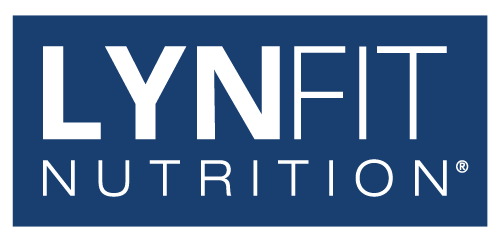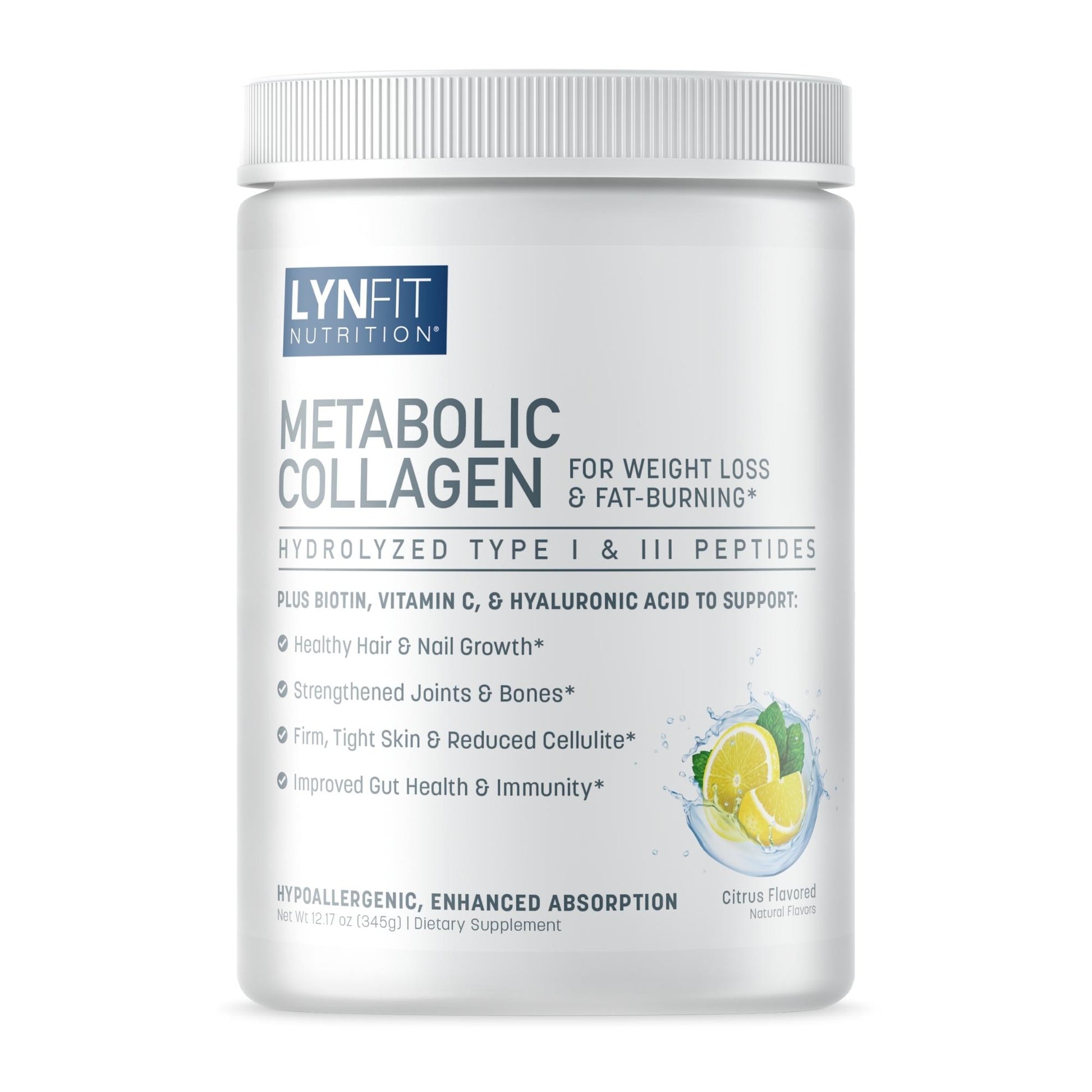Metabolic Collagen Powder (Close Out!)
Metabolic Collagen Powder (Close Out!)
LAST CHANCE to buy Metabolic Collagen Powder!
Due to the overwhelming popularity of our Metabolic Collagen Liquids, we have decided to discontinue the Metabolic Collagen Powder. This decision was not made lightly, and we apologize for any inconvenience.
Buy six (6) for 50% off and stock up now on our last-chance deal before it runs out and is no longer available.
*All sales are final; no returns, refunds, or exchanges are allowed.
Couldn't load pickup availability
Share
4.947368421 / 5.0
(19) 19 total reviews
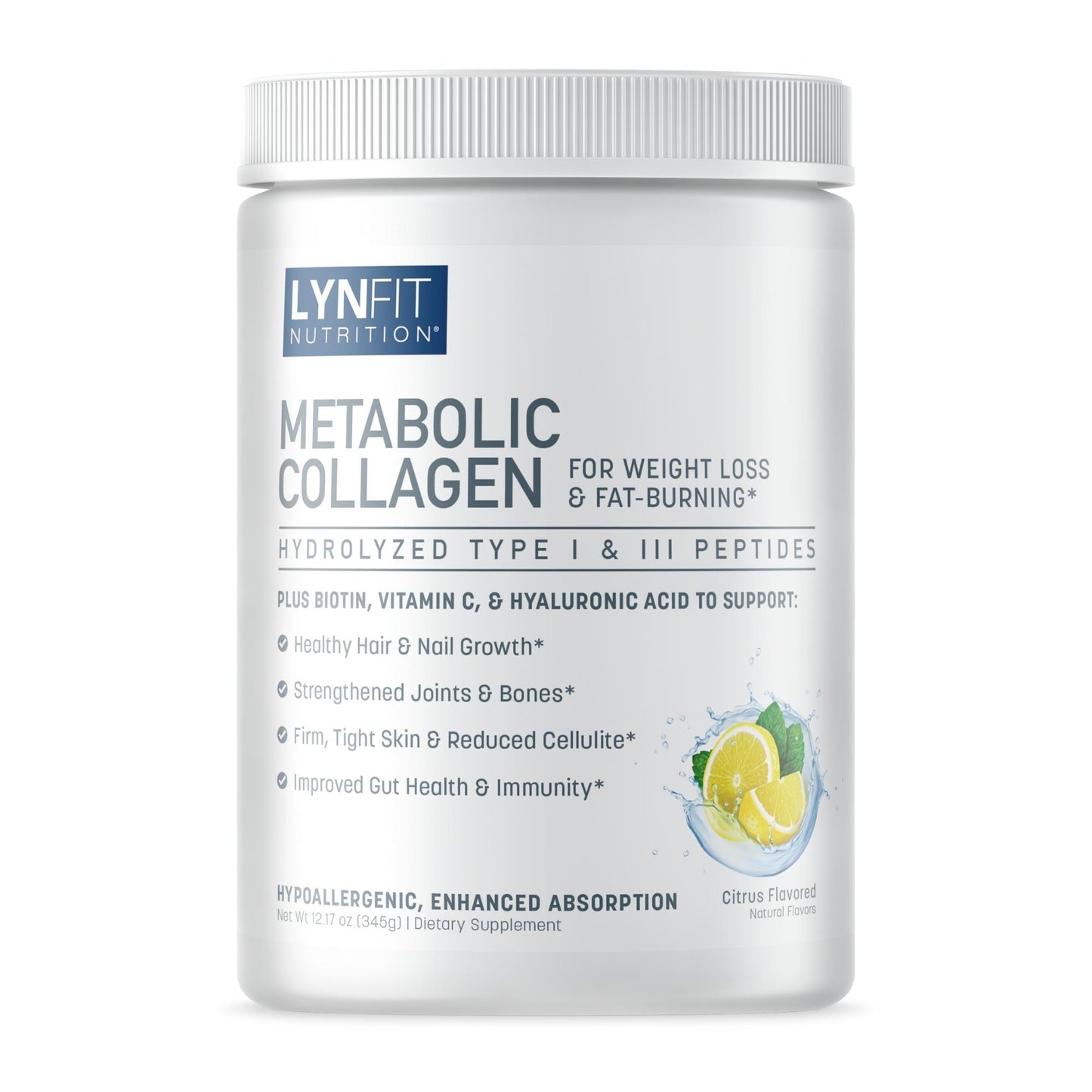



98% Absorption Rate for the Whole Body
Hydrolyzed Type I and III Peptides, plus Biotin, Vitamin C, and Hyaluronic Acid to Support:
- Healthy hair and nail growth
- Strengthened joints and bones
- Firm, tight skin, and reduced cellulite
- Improved gut health and immunity
When it comes to weight loss and melting off dangerous belly fat, the best way to ramp up your body’s collagen production is by consuming a collagen powder supplement versus trying to consume more collagen protein in your diet.
Collagen differs significantly from other protein sources such as beef, poultry, fish, eggs, dairy, and plant sources because it has a unique amino acid profile. It's incredibly high in glycine, proline, and hydroxyproline, found only in collagen protein. Combined, these amino acids make up 40-50% of the amino acids in collagen protein, which is 10-20 times higher than other common protein sources.
Why is that important? These are the raw materials your body requires to produce collagen on its own, making sure your body's collagen levels remain healthy. Research shows that consuming a particular type of collagen protein—known as collagen peptides—triggers the body to make more collagen and produce more hyaluronic acid, a lubricating fluid key to healthy, hydrated skin and healthy, supple joints.
Sure, you can buy pre-made bone broth, but there is no guarantee that your body will absorb or utilize the collagen it contains. Bone broth can become an expensive habit quite quickly.
If you're trying to lose weight, melt off dangerous belly fat, and improve gut and immune health, not all collagen supplements will help. Before you start taking collagen, there are a few things you need to know.
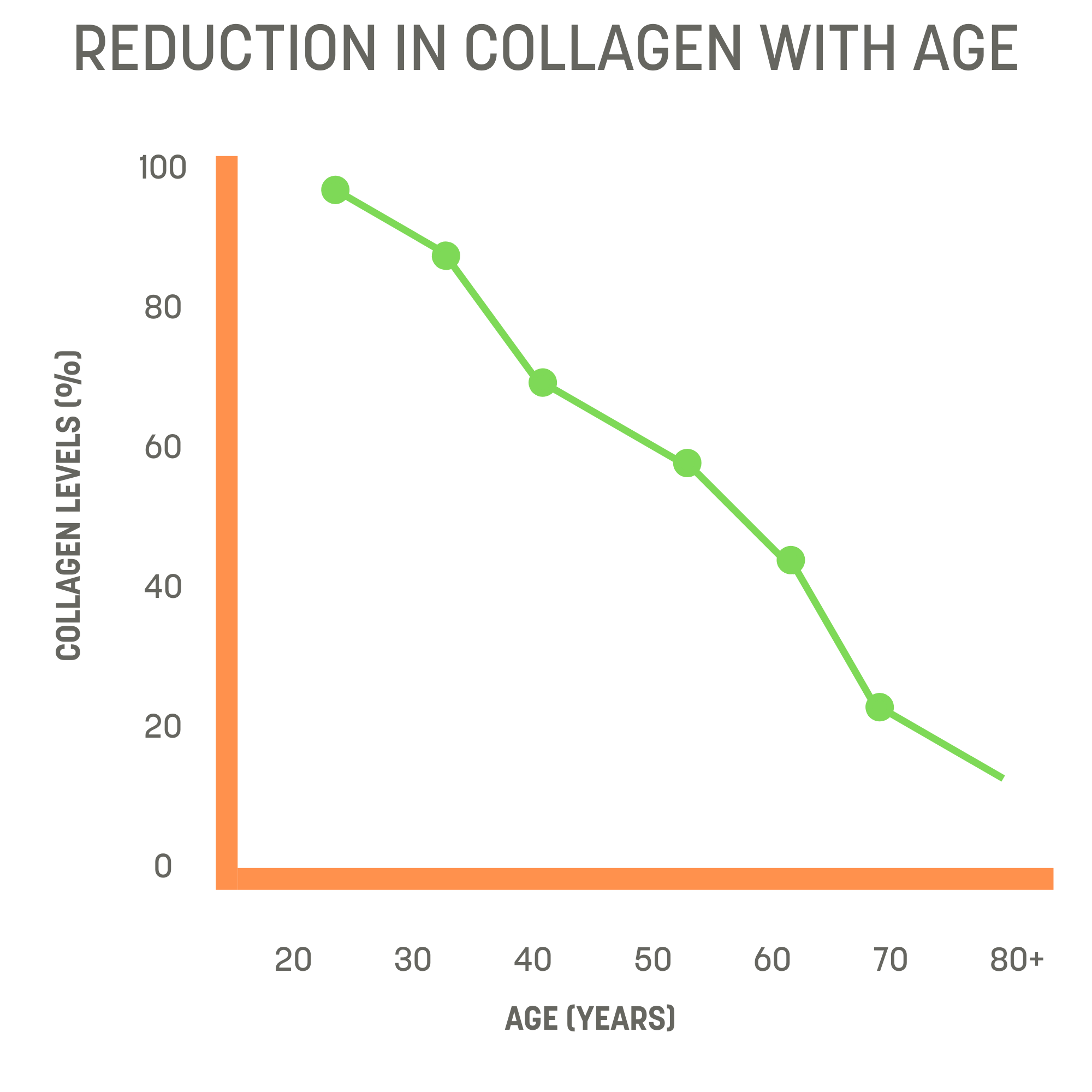
What Makes Metabolic Collagen Different?
Specific nutritional support for multiple whole-body benefits
LynFit Metabolic Collagen provides specific nutritional support for multiple whole-body benefits, starting with improving gut health, digestion, assimilation, and strengthening your immune health. All of these without causing weight gain, blocking fat loss, or causing digestive distress. It's the only collagen that can say it's metabolic and specifically designed to help those who are overweight, have a sluggish metabolism, are hypothyroid, or have sensitivities (allergies). Pure, potent collagen peptides from grass-fed, pasture-raised cattle (types I and III).
Of course, LynFit Metabolic Collagen Protein contains collagen protein that is naturally hydrolyzed and features bioactive collagen peptides that are easily absorbed intact and trigger the body to make more collagen on its own while stimulating the production of hyaluronic acid (the lubricating fluid that's a vital component of a healthy body and hydrated skin). Inspired by nature and perfected by science to...
- tighten, firm, and tone skin.
- reduce and soften fine lines and wrinkles.
- improve hair health, slow hair loss, and boost growth.
- improve and strengthen nails.
- alleviate joint aches, pains, and stiffness.
- protect joint, muscle, ligament, tendon, and cartilage health.
- strengthen bones and teeth.
- improve recovery and healing.
- enhance recovery after stress, exercise, or physical activity.
- preserve lean muscle, preventing metabolic slowdown.
- improve gut, brain, and cardiac health.
- improve whole-body and immune health.
LynFit Metabolic Collagen Protein Powder is a delicious, light, fresh, lemony citrus flavor that mixes and dissolves easily in cold or hot water or liquids. Thanks to nanotechnology, we formulated powdered collagen with a 98% absorption rate that doesn't clump. It tastes so great you will want to drink it, forcing you to drink more water... a win-win solution.
Add it to your warm water or tea, metabolic boosting protein shake, smoothie, lean and clean baked goods, homemade sorbet, or grab-n-go water bottle.
- Non-GMO
- Dairy-free
- Gluten-free
- Soy-free
- No artificial sweeteners, flavors, or colors
- Pharmaceutical-grade and clinically dosed
What is collagen?
Most collagen supplements:
- are not absorbed by your body, which leads to gastric distress, stomach ache, cramps, and constipation.
- cause weight gain, bloating, and edema (also elevates blood pressure).
- can elevate blood sugar/insulin levels (triggers cravings).
- don't work! Most people don't realize that if your collagen powder doesn't say it's metabolic (meaning, good for weight loss), it isn't. It will most likely cause weight gain and negatively affect your metabolic health. It is best avoided unless it's LynFit Nutrition’s Metabolic Collagen.
What is Collagen?
Collagen is the most abundant essential protein in your body. Collagen constitutes a whopping 30% of the protein in your body. Aside from water, collagen is the most plentiful substance in your body.
Over 90% of the collagen in your body is comprised of Type I and III collagen. Proteins in these types include glycine, proline, alanine, and hydroxyproline.
- Glycine: The amino acid found at the highest level in collagen requires more serine than your body can produce. Studies suggest the need for glycine supplementation to achieve maximum metabolic processes.
- Proline: A non-essential amino acid synthesized from glycine and essential in the function of joints and tendons.
- Alanine: An amino acid used in the biosynthesis of proteins.
- Hydroxyproline: An amino acid that plays an essential role in the stability of collagen.
Collagen is the glue (from the Greek word for glue) that supports, connects, and binds every cell in your body, holding everything together. Without proper amounts of collagen, your body can't function optimally.
Research indicates that by age 40, our body's ability to produce collagen decreases by 25%. By age 60, it has reduced by over 50%. Even though it’s made up of non-essential amino acids, meeting your body's collagen requirements through diet cannot be met, yet the demand for collagen is at its highest.
Proper amounts of collagen are vital for:
- Minimizing fine lines and wrinkles
- Firming and tightening skin
- Reducing cellulite
- Correcting weak, damaged nails and nail beds
- Thickening fine hair, slowing hair loss, and improving hair health and regrowth
- Improving circulation
- Protecting joint health
- Hydrating and cushioning joints, keeping them pliable and less stiff
- Supporting bone matrix (36% of bones are made up of collagen Type I and III)
- Improving tooth and gum health (promotes gum growth)
- Improving digestion and nutrient assimilation
- Strengthening gut lining, improving gut and immune health
- Creating strong, more pliable, and resilient tendons and ligaments
- Improving brain health and memory
- Preventing age-related muscle wasting, preventing metabolic slowdown, and loose crepey skin
- Promoting glycine production, which builds lean muscle tissue and improves fat-burning while you sleep
Why do you need to take metabolic collagen powder?
When we are young, our bodies make all the collagen they need. That's why our skin is firm, glowing, less wrinkly, our joints are supple, and our digestion is less of an issue. As we age, our body loses its ability to make collagen. To make matters worse, our body begins to rapidly break down collagen, especially when stressed, sick, dieting, engaging in daily exercise, or repetitive stress activities like typing, texting, or performing work or household chores. Sun exposure and our diet and everyday medication use also affect the breaking down of collagen.
Consuming sugar, refined carbohydrates (anything you buy in a store, even if it appears healthy), and poor-quality fats such as industrially produced vegetable oils and saturated fats that are over-consumed (due to diets like full-fat keto and Paleo) all contribute to collagen depletion.
The bottom line is that your body produces less collagen, which you must supplement daily as you age.
Collagen reduction shows up in a variety of ways:
- Saggy, crepey skin
- More lines and wrinkles
- Hair getting thinner and more damaged and growing slower
- Nails grow slower and are less strong, becoming brittle and less healthy
- Joints become stiff, ache more, and less flexible
- Recovering after exercise, golf, tennis, or housework is more challenging
- Occasional gut-related complaints such as constipation, IBS, leaky gut, indigestion, gas, bloating, feeling nauseous, full, diarrhea, food sensitivity, SIBO, lactose intolerance, inability to digest certain foods you once were able to... all begin to pop up due to the lack of adequate quality collagen that your body can absorb
The good news is that it's easy to rev up your body's collagen production without causing weight gain or gastric distress. Make sure you're taking LynFit Metabolic Collagen every day!
Metabolic collagen is bioactive and more absorbable than any other collagen supplement you can buy. Most collagen powders, including most bone broths and gelatin supplements, are not absorbed by our bodies; therefore, they go unused.
- Most are missing one of the essential amino acids. Collagen protein is missing the essential amino acid tryptophan, so we suggest combining them for maximum potency. Our collagen will still work if you choose not to combine it with essential amino, but it is ten times more potent when you do.
- Most taste and smell, which limits how you can, or will, want to use them and can ruin the taste of whatever you mix them in.
- Most don’t dissolve well in cold or room temperature liquids, often leaving a sticky, clumpy mess at the bottom of your glass that’s unpleasant to drink and clogs your system.
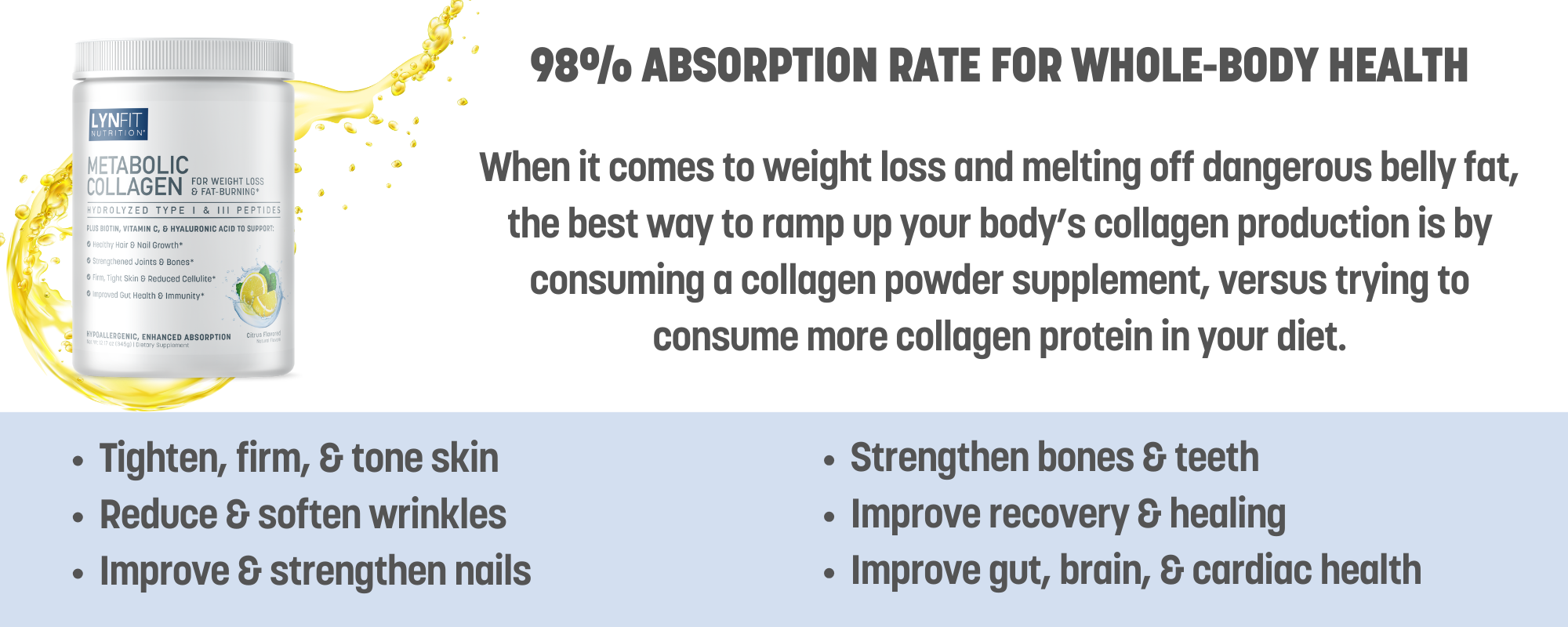
What's In It?
Nutritional information

How To Take It
Personalized usage guide
Add one (1) scoop to your favorite liquids or food. It provides your body with the nutrients it needs to support whole-body health, improve immunity, and improve hair, skin, nails, and joints. Try these popular ways to enjoy Metabolic Collagen Powder.
- Add (1 scoop) of Metabolic Collagen Powder to (8 oz.) of warm water first thing in the morning (it won't break your fast)
- Add (1-2 scoops) to Vanilla Metabolic Boosting Protein Powder for a delicious metabolic and collagen-boosting Lemon Creme Smoothie
- Add (1 scoop) Metabolic Collagen + (1 scoop) LynFit Essential Aminos to (8-10 oz.) of cold water for a delicious Strawberry Lemonade
Unlike many bone broth, gelatin, and collagen powders, which can only be added to hot liquids, LynFit Metabolic Collagen Protein Powder mixes easily in hot and cool liquids. And, unlike some collagen powders, which have a distinct taste and smell, our light citrus-flavored Collagen Protein is delicious and smells enticing. It tastes so delicious that you'll never miss your warm water with a lemony taste again, which is one of the best health-improving habits needed to keep your body toxin-free. With a bit of creativity, the possibilities are endless. Here are the most popular ways to add collagen protein to your diet.
For weight loss and fat-burning, you can add it to:
- Warm or cold water
- Coffee or espresso drinks
- Tea
- Protein shakes
- Smoothies
- Mocktails
- Salad dressings
- Soup
- Homemade popsicles, sorbets, flavored Ice
- Homemade ice cream
- Protein pancakes
For weight gain and health maintenance (chemo/cancer patients, kids, teens, and elderly), you can add it to:
- Juice
- Overnight oats
- Yogurt
- Baked goods
- Cocktails (our collagen blunts blood sugar spikes)
- Gummies
FAQs
Do I need to take collagen if I’m already drinking protein shakes?
Yes. Collagen differs significantly from other familiar protein sources such as poultry, beef, fish, eggs, dairy, and plant sources because of its unique amino acid profile. It's rich in glycine, proline, alanine, and hydroxyproline, only found in collagen protein. Combined, these amino acids account for 40 – 50% of the amino acids in collagen protein, which is 10 – 20 times higher than consuming other common protein sources.
This is important because these specific proteins are the raw material your body needs to produce the collagen required to stay healthy. Research shows that consuming particular types and amounts of collagen protein, known as collagen peptides, triggers the body to make more collagen. More hyaluronic acid is produced, a lubricating fluid that's one of the main components of healthy, hydrated, cellulite-free skin and healthy joints.
Where can I find collagen protein? Are all collagen supplements okay for weight loss?
Even though collagen is the primary structural protein in the lean proteins we eat, unless you're vegan, most of us no longer eat the skin, bones, or cartilage. Since collagen is found in these places, and most of us eat skinless, boneless lean muscle meats (which do contain some collagen protein), the collagen they provide has a different combination of amino acids that are incomplete and do not contain the specific amino acids and functional properties.
What's the best collagen supplement for weight loss?
The problem with most collagen supplements sold today is that they aren’t absorbed by our body, clogging our system and affecting digestive, gut, and immune health.
LynFit Metabolic Collagen Peptide Powder solves all collagen problems and makes it more delicious, easy, and affordable for everyone to get collagen in their diet. It's metabolic, meaning it enhances weight loss and improves metabolic health. It has a higher absorption rate, so it's thyroid/autoimmune and clean keto-friendly.
Research & References
Citations
- Cell Tissue Res. 2003;311(3):393-9.
- The Open Nutraceuticals Journal. 2015;8:29-42.
- Int J Food Sci Nutr. 2009;60 Suppl 2:99-113.
- Skin Pharmacol Physiol. 2014;27(1):47-55.
